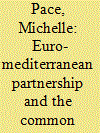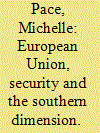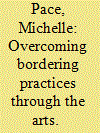|
|
|
Sort Order |
|
|
|
Items / Page
|
|
|
|
|
|
|
| Srl | Item |
| 1 |
ID:
116892


|
|
|
|
|
| Publication |
2012.
|
| Summary/Abstract |
It has become common to regard consociational democracy as a method of managing conflict in ethnically divided societies but little attention has been paid to its applicability to societies where the primary political cleavage is between secular and religious forces. This article seeks to redress this imbalance by examining the applicability of consociationalism to the case of the Palestinian Territory. We argue that, while Palestinian society is characterised by 'pillarisation' along a secularist/Islamist cleavage, formal power-sharing between the representatives of the two main Palestinian factions, namely Fatah and Hamas, has proved elusive. However, rather than seeking to explain the seeming inability of the factions to share power by reference to the nature of the cleavage, as other authors have done, we instead highlight the contextual factors that have made power sharing difficult to achieve, namely the difficulties Hamas and Fatah face in accepting each other as political partners, and opposition from external actors.
|
|
|
|
|
|
|
|
|
|
|
|
|
|
|
|
| 2 |
ID:
052099


|
|
|
|
|
| Publication |
Summer 2004.
|
| Summary/Abstract |
This article assesses the European Union's Mediterranean policy from a discursive perspective and focuses specifically on the actual, identifiable impact of the Union's security discourse. In doing so it seeks to demonstrate how the Union's Mediterranean security policy has impacted on issues of identity. The implicit reference to sub-regional cooperation in the Union's Common Mediterranean Strategy may be read as a way to facilitate the lack of a clear definition of exactly what type of security or rather insecurity the European Union as a whole is trying to address when dealing with its 'Mediterranean'.
|
|
|
|
|
|
|
|
|
|
|
|
|
|
|
|
| 3 |
ID:
101010


|
|
|
|
|
| Publication |
2010.
|
| Summary/Abstract |
With the coming into force of the Euro-Mediterranean Partnership, the European Union (EU) annunciated what one could term an 'inclusionist approach' to security whereby this policy framework was based on supposedly joint commitments by all parties concerned to 'cooperative security'. However, EU actions on the ground in the south have shown that, despite good intentions, such cooperative security endeavours have, thus far, hardly materialised. The result instead is an 'exclusionist' policy, where the reduction of illegal migration from the south takes top priority in EU security discourse. Post-9/11, in the policy area of 'counter-terrorism' measures, the EU likewise demarcates 'liberal zones of civilisation' from 'illiberal' ones, leaving the dirty work of counter terrorism to countries such as Egypt and Morocco. In terms of governmentality, this may be described as a 'surveillance and control' approach to security: therefore, it is argued here that the EU, through its governance model, is actually enabling further in-security and in-stability in the south.
|
|
|
|
|
|
|
|
|
|
|
|
|
|
|
|
| 4 |
ID:
163783


|
|
|
|
|
| Summary/Abstract |
During 2014, Denmark received nearly 15,000 asylum seekers, almost twice the number from the previous year as more people fleeing Syria’s war fled to Europe. By 2016, Denmark succeeded in making the country highly unattractive as a destination for refugees fleeing war torn countries. The country introduced a controversial ‘jewellery bill’, placed adverts in a newspaper in Lebanon dissuading refugees from contemplating a trip to Denmark, and cut assistance benefits for refugees by half. These state bordering practices aimed at securing some kind of ‘Danishness’. This article aims at ascribing agency to young Syrian refugees in Denmark, who have experienced these bordering practices and who seek to counter these practices by participating in meaningful social interactions with their Danish counterparts. The empirical focus is an artistic enactment–a weeklong dance workshop that brought these youngsters together as a distinct form of practice that brings about the conditions of possibility for meaningful integration. Conceptually, it draws upon Arendt’s theory of action and notion of ‘plurality’ to frame how such encounters come about.
|
|
|
|
|
|
|
|
|
|
|
|
|
|
|
|
| 5 |
ID:
169453


|
|
|
|
|
| Summary/Abstract |
After Tony Blair resigned as the United Kingdom’s prime minister in June 2007, he was appointed as the official envoy of the Quartet on the Middle East. His appointment was marred with controversy not the least with regard to his suitability for the role and his performance as peace envoy, with many observers questioning his ethical credentials. The EU along with the US, Russia and the UN make up the Quartet and funded Blair’s office until 2012. With the US and the EU as the key regional players in this conflict, Blair became an embodiment of these players in this specific role. This article employs critical discourse analysis to nuance whether Tony Blair’s role as Middle East envoy, and as an embodiment of the EU, was indeed a legitimate one in terms of achieving at least some of its stated aims, particularly those pertaining to the Palestinians who live under Israel’s colonization. It does so by engaging with the work of John Street and more broadly the literature on celebrity politicians and by counterbalancing this conceptual framework with a critical reflection on Blair’s time as Middle East envoy.
|
|
|
|
|
|
|
|
|
|
|
|
|
|
|
|
|
|
|
|
|